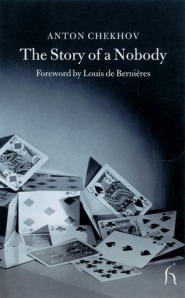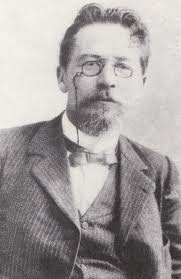And we sail along with Russian Season, this time a slim novella by Chekhov! “The Story of a Nobody” is a little Hesperus Book I have and it’s translated by Hugh Aplin. I must admit it surprised me a bit to find that Chekhov had written these longer pieces, because I always associated him with either plays or shorter short stories. However, it seems he has done some of these longer works and this came with good reviews for both the stories and Hugh Aplin’s excellent translation, so what more could I ask?
The novella is narrated by the Nobody, known to us initially as Stepan. He has taken employment as a manservant with a gentleman called Orlov, though his real reason is to try to get access to Orlov’s father. The latter is an important minister and Stepan is a revolutionary of sorts, determined to assassinate him. However, from this simple premise, things develop very differently to the way Stepan had planned. Complications arise in the form of Zinaida Fyodorovna, a married woman who is Orlov’s lover. She leaves her husband, determined to be a modern, free woman and live with Orlov. He, however, had not expected anything like this, being a man detached from sensation and emotion, regarding love as simply a need to be satisfied, and resenting Zinaida’s taking her life into her own hands and visiting herself upon him. Things get worse when Stepan becomes fascinated by Zinaida, longing for a normal life instead of the revolutionary one. He is fighting against consumption and losing his rebellious fire, just as Zinaida is gaining hers. They flee St. Petersburg together but what will become of them?
This is a fascinating little story, beautifully written and with vivid character sketches. I haven’t read enough of Chekhov’s short stories to make definitive statements, but this does seem to me to have more depth that some of his works I’ve read. Stepan is an intriguing person, steeled in revolution but tired of it – desperate for what he considers a normal life, home and hearth; in fact, everything that Orlov, the conventional gentleman, could have but rejects, preferring to present an ironic persona and keep himself to himself. Both men in many ways could be said to have adopted a pose which is not really their own nature, but Orlov will not give up his way of life – he accepts that there is wrong in both the upper and lower strata of society, but will stick with the upper as it is closer to his nature and he is lazy and used to his way of life. Stepan, on the other hand, is burnt out from years of zeal, and simply seems to wish for peace. He has become disillusioned with the possibility of changing the world for the better by violence, and when he is given the opportunity to actually carry out his mission, he has become unable to do so.
“Why are we exhausted? Why do we, at first so passionate, bold, noble, full of belief, why do we become, by the age of thirty or thirty-five, completely bankrupt? Why does one fade away with consumption, a second put a bullet through his forehead, a third seek oblivion in vodka and cards, a fourth, to deaden his fear and anguish, cynically trample underfoot the portrait of his pure, fine youth? Why do we, once fallen, no longer attempt to rise, and, when we lose one thing, why do we not seek another? Why?”
The book’s other main character, Zinaida, is a complex figure, a mixture of emotion and intellect who seems to be desperately searching for something. When she learns the truth about how Orlov has been deceiving her, she throws herself at Stepan’s cause, as it seems she needs something to fill the void. Women revolutionaries and free thinkers were not unusual in Russia at the time, and she has once again read too many books for her own good! References are made particularly to Turgenev and Dostoevsky, and I found myself thinking about how differently Russian writers from different ages would have treated this particular subject and plot. Gogol might well have ignored the political and simply gone for the human side of the story, looking for the grotesque. Dostoevsky would have toned down the grotesque a bit but had the characters behaving much more intensely and dramatically and the work would have been several times the length! But Chekhov’s prose is lucid, vivid and clear; he makes the points he wishes to make about humanity and tells a compelling story at the same time. We are shown the inequality, injustice and waste, but subtly; few of the characters are stereotypes and all have dimensions that are not obvious from the start; and Chekhov is not judgemental as an author, allowing us to decide what we feel about the characters and their views on life.
This is an excellent little novella, very thought-provoking and one I would like to read again soon – I’m still ruminating on some of the points it raises. If you’re thinking of reading it, I would really recommend the Hesperus Press edition with the foreword by Louis de Bernieres. The book *has* been republished by Alma Classics (like several Hesperus titles) but in many cases they seem to have dropped the forewords and sometimes the introductions – which is a shame! A highly recommended work, which has made me very keen to pick up more Chekhov.








May 06, 2013 @ 02:50:11
I’m very keen on Russian literature, but have not read much Chekhov. I know you mentioned Hugh Alpin at my blog: I’ve never heard of him, probably because most of my Russian books are old.
I don’ t know the Alma books: perhaps we don’t have them there. But I can certainly find a copy of the Hesperus.
May 06, 2013 @ 10:24:36
All I know about Aplin is that he’s head of Russian at a London school and seems to have produced a large number of translations. Those I’ve read of his I’ve got on very well with, so I tend to default to his translation of a book if it exists. Alma Books are sometimes known as Oneworld Classics and they and Hesperus both have websites so it’s worth giving them a look!
I’m enjoying exploring Chekhov and am eagerly awaiting the arrival of a copy of “The Shooting Party”!